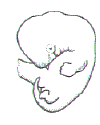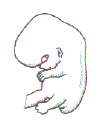|
Growing Up
What you should know.
- The male sex cell is the
sperm, the female sex cell is the egg.
- Sperms are made in the
testes and eggs are made in the avaries.
- The sperm tube carries
the sperm to the penis: Glands add fluid to the sperms to make semen.
- The egg tube carries an
egg to the uterus every month.
- In a pregnant woman the
baby grows in the uterus.
- §During love-making the
erect penis is placed in the vagina.
- Semen passes out of the
penis into the vagina.
- At fertilisation the
sperm cell penetrates the egg and its nucleus joins with the egg nucleus.
- If the egg is fertlised
it passes down the egg tube and settles into the uterus.
- The fertilised egg grows
into a foetus.
- The placenta acts as a
barrier to to some infections and some harmful substances.
- The cord carries blood
with oxygen and food to the foetus from the placenta.
- The fluid sac acts as a
shock absorber to protect the foetus.
- Contractions of the
uterus muscles are the start of labour.
- babies are usually born
head first through the vagina.
- Later the cord and
placenta are passed out as the after-birth.
- At adolescence our bodies
and emotions change.
- Hormones are chemicals
that cause these changes.
- If an egg is not
fertilised, then the uterus lining breaks down and leaves through the
vagina. This is a 'period'.
Puberty
Puberty is the time when you
change from having a child's body to having an adult body and results in the
ability to have children. Your sex organs start to work and your whole body
grows and changes shape. For most people, puberty is a challenging and
unsettling time. Understanding what puberty is all about and knowing what to
expect will help you through these difficult but exciting few years.
|
Physical Changes |
One of the basic
characteristics of life is reproduction. Like other mammals, humans are
born with bodies that are not able to reproduce straight away. Babies and
children need to grow, learn, and form loving relationships with their
families. The bodies of young boys and girls are very similar in shape.
Then comes the time to develop into sexually mature individuals, capable
of having sexual relationships and perhaps, in time, children of their
own. This section answers the most common questions about puberty. |
|
Emotional Changes |
'Adolescence' is a word
that is often used to describe the period of life starting with puberty
and lasting all the way through the teens. It isn't really a biological
word like 'puberty', as it takes account of the way you feel and relate to
others as well as the changes to your body caused by hormones. Any time of
change in your life tends to affect the way you feel. Some people manage
to sail through adolescence with few worries - they are the lucky ones!
Most people find things more difficult. The important thing is to realise
that this is completely normal, and lots of people find these years a bit
of an emotional rollercoaster. |
Puberty usually begins at
around the age of 11 for girls and 12 for boys. Exactly when puberty starts
varies from one person to another. Anything between the ages of 9 and 14 is
perfectly normal. Occasionally, puberty can start earlier than 8 or be delayed
until after 14. If this happens, a doctor may recommend a course of treatment to
adjust the timing of puberty. If you're a girl, it's sensible to speak to your
school nurse if your breasts start to develop before you are 9 years old, or if
they haven't started to develop by the age of 14. If you're a boy, it would be
sensible to visit your doctor if your genitalia (testicles and penis) or pubic
hair grow before you are 9 years old, or if they haven't started to grow by the
age of 14. Puberty normally lasts for 2 to 3 years. Again, this varies from one
person to another. It can take as little as 1½ years and as long as 5 years.
For both boys and girls, the
hands and feet start growing first. Apart from needing to get bigger shoes all
the time, this can make you feel a bit self-conscious and awkward until the rest
of your body catches up. There are also changes to the skin. More sweat glands
develop to help cool down your bigger body by sweating. Tiny glands in the skin
called sebaceous glands begin producing more sebum. This oily stuff keeps your
skin moisturised and supple, but it can cause a few problems as your body
adapts. Sebum can block up sweat pores, causing whiteheads and blackheads. These
can easily become infected, filling with puss and becoming red, swollen and
sore. Large numbers of these spots are called acne, and can be embarrassing and
uncomfortable. Regular washing can help prevent spots, and there are treatments
for very serious acne. Again, talk to your school nurse if you are unhappy or
worried. The thing to try and remember is that most people's skin sorts itself
out after puberty, so it is a temporary, if annoying, problem.
Some Worries You
May Have............
-
Worrying
about the way your body is changing, and what others are thinking about the
way you look.
-
Feeling
that you're different from friends of the same age - either more physically
developed or less. Either can be a source of worry, and can make you feel
isolated from your friends.
-
Being
misunderstood, especially by your teachers and parents.
-
Wanting
more control over things. This can bring you into conflict with adults in
authority like teachers and parents.
Wishing to be part of the crowd, fitting in with a group of friends, going
places and doing things together. Again, this can cause arguments if your
parents don't approve of your choice of friends or clothes.
-
Concern
about your sexuality - whether you might be gay or lesbian and how you will
handle it if you are.
-
Anxiety
about the future as you start to think more seriously about what you want to
do and what sort of person you want to be. Adults often see this as
sulkiness or being moody and self-centred - another source of tension.
Just to make things even more
complicated, puberty brings another explosive ingredient into your life - sex!
As well as making you change physically, sex hormones affect the way you feel,
preparing you for sexual maturity. Most people start to experience sexual
feelings and fantasies. These can be very strong and difficult to deal with.
It's common, and normal, to imagine kissing and having sex with other people.
Most teenagers have 'crushes' on adults they fancy, and imagine having sex with
them even when this is obviously out of the question. It's also common to have
sexual fantasies about members of the same sex, as well as members of the
opposite sex.
Then there are the pressures of school, with exams, option choices, harder class
work and more demanding homework. Just to top it all, it's a time when many
people need to wear braces on their teeth or start wearing glasses. All in all,
it's no surprise that puberty and the teenage years can seem so tough, and
knowing that what you're feeling is 'normal' doesn't make it any easier to cope.
Building respect for yourself and gaining confidence takes time, and it's easy
to get knocked back now and again. Teenagers can be incredibly cruel, and most
people get teased about something from time to time. Having a bit of a joke is
one thing, but deliberately trying to hurt someone by teasing them is a form of
bullying. This behaviour sometimes comes from emotional or physical abuse at
home. At other times it's an attempt to look 'hard' in front of mates. Whatever
the reason behind bullying and teasing, it's quite common and can make the
victim feel desperately lonely and miserable.
Hormones
Hormones are chemicals that
are made in several organs of the body. They are released into the blood in tiny
amounts, and travel through the body to other organs. These chemical messengers
co-ordinate the different organ systems, so that they grow and develop correctly
and work together properly. Some hormones have a sudden, dramatic effect.
Adrenaline, for example, is released if you are frightened or nervous. It
prepares your body to run or fight, causing 'butterflies' in your stomach by
sending blood to your muscles and away from your digestive system. It makes you
alert and you breathe quickly. The effect doesn't last for long, though, and
your body soon returns to normal after you've calmed down. Other hormones have
slower effects that last for a long time. Growth hormones and sex hormones are
like this. Puberty starts when the pituitary gland begins releasing hormones
into the blood which tell the sex organs to start making sex hormones. The
pituitary is a small organ, the size of a pea, in the middle of your head just
underneath your brain. It also makes human growth hormone, which helps cause the
growth spurt during puberty. In boys, the testicles (also called testes) start
making the male sex hormone testosterone. This is what causes most of the
changes during puberty. In girls, the ovaries start making oestrogen and
progesterone. Oestrogen is the female sex hormone that causes most of the
changes during puberty. Progesterone, oestrogen and other hormones work together
to control the menstrual cycle. Surprisingly, men's bodies also make a small
amount of oestrogen and women's bodies make a small amount of testosterone.
Having Children
      
  
What you should be able to do.
- List the different stages
in a human life in the correct order.
- Decide what are good
reasons for having children.
- Label a diagram of the
male reproductive system.
- Label a diagram of the
female reproductive system.
- Observe differences
between a sperm and an egg.
- Find out the rules and
traditions that some societies have which stop too many children from being
born.
- Observe changes in the
developing foetus.
- Write a story about life
in the uterus.
- Design a poster to show
pregnant women that their habits will affect their babies.
- List the physical and
emotional needs of a baby.
- Discuss in a group the
needs that parents have to provide for in their children.
- Identify changes that
take place at puberty.
- Discuss in a group
emotional problems that occur at adolescence.
|
